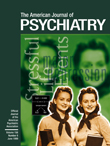To the Editor: The Clinical Case Conference by Laura Weiss Roberts, M.D., and colleagues
(1) demonstrates much of what is wrong with American psychiatry today. One of the authors, Michael Hollifield, M.D., had the great luxury of
five sessions to evaluate the mental status of “Brother David.” He apparently went about it in a cookbook fashion, checking off mental status characteristics and matching them with axis I diagnoses from DSM-IV. He ignored Brother David’s lifelong pattern of anhedonia—years of agony and an array of unstable symptoms—his inability to form interpersonal relationships, and the intense loathing and fear that sexual impulses stirred up in him. His 10-year rumination about castration certainly seems to indicate pathological thought processes. During these interviews, there seemed to be a restricted affect, a peculiar concreteness of thought (“if your right hand offend thee…”), and tantalizing hints of delusional thinking (“lower existence,” “rising to a higher level”). Either Brother David was clearly evasive when describing his religious group or Dr. Hollifield was reluctant to press for details. All of this made the two urologists rightly suspicious of repressed unconscious or suppressed conscious thoughts. It is astonishing that the psychiatrist decided that since Brother David was not floridly psychotic or complaining of any ego-dystonic symptoms, he was therefore making an “authentic” conscious decision. One of my colleagues wondered what Dr. Hollifield would have said had Brother David requested amputation of his right arm because he suffered from repeated impulses to punch people.
Clearly, Brother David was struggling with conflicts about gender identity, sexual drive, and overly strict primitive superego introjects. He did have a host of glaring and disruptive symptoms for many years and in fact was clinically depressed most recently. Psychodynamic concepts of drive and defense, compromise formation, shifting of defenses, externalization, and submission of one’s decisions and actions to an external superego figure are all demonstrated. The nature of symptom as the resultant of drive and regressive defenses is demonstrated. The psychiatric recommendation was to allow the orchiectomy but to urge a less dramatic treatment first—i.e., pharmacotherapy. The reluctance about allowing the orchiectomy was only that it might result in unknown long-term medical and psychological “implications”—not that it was prima facie insane!
American psychiatry has lost its mind! It no longer considers the function of the mind, only of the brain, as detected by positron emission tomography scans and Hamilton Rating Scale for Depression scores. We no longer listen to the patient with analytic understanding, seeking symbolic meaning, feeling the transference and the countertransference, and using those data to aid our understanding. Where was the recommendation for psychodynamic psychotherapy? Where was the recommendation for dynamic group therapy, in view of the need for an external controlling group identity? Brother David was probably too enmeshed in his pathological “folie à 39”—please do not call it a religion—to embrace a treatment program. But we do not have to enter his psychosis with him! Someone has to remain sane.

